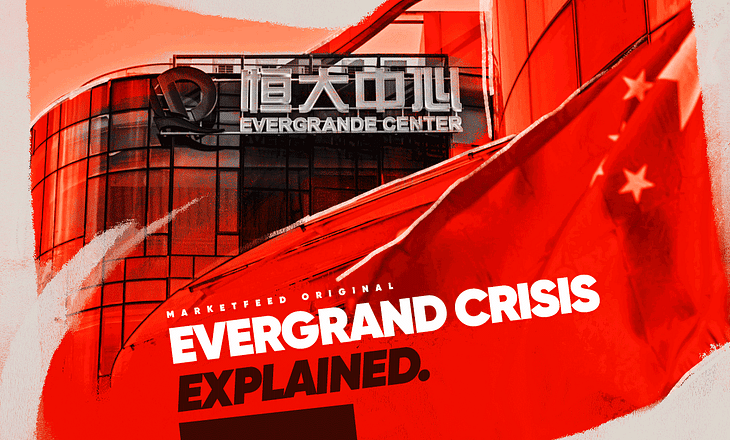The Evergrande Crisis Explained

One of the biggest real estate companies in China is on the brink of collapse. There is speculation whether it could lead to a similar crisis as that of the Lehman Brothers downfall in the US in 2008. Stock markets around the world have already registered significant corrections as a result of the news from China. In this article, we take a closer look into the Evergrande crisis and how it could cause a ripple effect across global economies.
The Story
The Evergrande Group is China’s second-largest real estate developer. The company employs nearly 1.2 lakh people and has a presence in more than 280 cities. It has reportedly established over 1,300 projects across the country. Evergrande also has an electric car unit and investments in the sports, tourism, insurance, and health sectors. It is a Fortune Global 500 group enterprise and is listed on the Stock Exchange of Hong Kong. The real estate company reported sales of $110 billion last year. It was a company that aimed at providing affordable housing to the Chinese working class.
Unfortunately, Evergrande has now become synonymous with an imminent global financial crisis. Trouble has been brewing at the company over the past few months. It has piled up more than $300 billion in debt. Their liabilities are equivalent to 2% of China's gross domestic product (GDP)! The company is now scrambling to raise funds to pay its lenders and suppliers. Evergrande was downgraded multiple times by credit rating agencies due to poor cash flow. Its shares have plummeted more than 80% this year. Their offices are now swarmed with investors, employees, and suppliers that want to claim what is owed to them.
Evergrande made headlines last week when Chinese authorities reportedly told banks not to expect the company to clear its interest dues. The real estate developer is likely to default on all upcoming payment obligations. The company makes up ~4% of total property sales in China. However, it has been pointed out that a slowdown in sales is the primary reason behind its present troubles.
What Led to the Crisis?
Over the past decade or so, the Chinese government has facilitated easy financing options to support real estate groups across the country. Borrowing costs have declined considerably, which allowed these companies to acquire a large number of land parcels. However, with a limited land stock in China, the buying spree of real estate firms created artificial scarcity. This ultimately led to a significant rise in property prices. Chinese citizens are now finding it difficult to afford houses and apartments. Moreover, real estate firms such as Evergrande have collectively piled up hundreds of billions of dollars in debt.
Recently, China’s regulators imposed new limits on real-estate borrowing as part of the Communist Party’s campaign to reduce dependency on debt. This crackdown on real estate developers is what damaged liquidity from Evergrande’s bonds.
Various analysts have also attributed the crisis at Evergrande to its ambitious expansionary moves. Within a few years, the company had diversified into the electric vehicles, sports, theme parks, food and beverage, groceries, and dairy products segments. It borrowed billions to acquire assets and fund new projects. They even sold apartments at low margins to raise capital quickly.
How Will Evergrande’s Collapse Affect Markets?
Evergrande Group’s suppliers, bondholders, and banks are hoping to receive repayments. The company’s customers have been waiting for years to move into their new homes. The realty firm is sitting on top of nearly 800 unfinished residential projects. The collapse of Evergrande will cause a ripple effect across the entire real estate industry in China. This is because one in five of the largest property developers in the country has breached all debt limits imposed by Chinese regulators. Property prices could crash if these companies try to get rid of unsold homes. Nearly 70% of the total wealth of the Chinese population is held in real estate, and a sharp decline in prices will adversely affect them.
The global economy will also be impacted as foreign financial institutions and businesses have exposure to Evergrande. The Indian metals, steel, iron ore, textiles, garments, chemicals, and tyres sectors are likely to be severely affected if the Chinese government is not too keen on a timely bailout of Evergrande, according to analysts. We saw that our metal stocks fell sharply on Monday (Sept 20) due to rising fears that the housing sector slowdown may hit commodity demand in China— the world’s largest consumer of metals.
Recent Updates
Experts state that the Communist Party of China has the necessary resources and political power to mitigate the collapse of its real estate industry. The Evergrande situation is unlikely to develop into a full-blown decline of the global markets. As per a BloombergQuint report, China’s central bank has infused nearly $17 billion in short-term liquidity (cash) into the country’s financial system. This move is aimed at calming the markets amidst the Evergrande crisis. Further, the company has offered to repay debt in the form of property and parking spaces.
The focus will now turn to whether the developer can pay $83.5 million (~Rs 615 crore) of interest due Sept 23 (Thursday) on a five-year dollar bond. Interestingly, Evergrande’s shares jumped more than 30% today on reports that one of its subsidiaries has negotiated interest payments on yuan bonds. Let us look forward to seeing how the situation unfolds in the days to come.
Stock markets around the world will continue to keep a close watch on the events that transpire in China. What are our views on the Evergrande crisis? Let us know in the comments section of the marketfeed app.


Post your comment
No comments to display